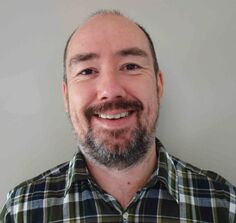About me
Chris Rudyard MNCPS Acc.
Accredited & Reg.
Over 20 years professional experience in mental health services
More than 19 years counselling & psychotherapy in professional settings
Fully Insured, Qualified Professional &
Member of Department of Health's' Accredited Register.
Accredited & Reg.
Over 20 years professional experience in mental health services
More than 19 years counselling & psychotherapy in professional settings
Fully Insured, Qualified Professional &
Member of Department of Health's' Accredited Register.
I'm Chris - people who come to see me usually want a psychotherapist with lots of experience, who is adaptive, an active part of the therapeutic process, and who has completed a lot of training.
I'm not one of those counsellors who claim to be an expert in any one area, as this creates a narrow view of the complexities of what it is to be human. Being a seasoned therapist, I know it takes at least 5 years to really start to get to grips with being a therapist, and what it entails working with people in this way.
Most counsellors and psychotherapists in the UK now, are trained in Person Centred, CBT, EMDR, Psychodynamic, Gestalt, and Transactional Analysis. I'd guess in that order. These are mostly what you might be offered on the NHS or Corporate Organisations.
The way I work now is far off traditional CBT, EMDR & Person Centred Therapy.
My approach is more unique to me because I'm trained in a number of other
trauma therapies and somatic psychotherapies, Inc:
Accelerated Experiential Dynamic Psychotherapy, Brainspotting, EMDR, IFS-Internal Family Systems, Lifespan Integration & Sensorimotor Psychotherapy.
These days I'm not really into the more analytical approaches, or heavily cognitive approaches to psychotherapy such as CBT and Person centred (although I have received training in these too). I do believe approaches such as CBT have a place and can be very helpful. I've even used these approaches myself early on in my career with 'positive outcomes', but like many, I have found it lacked some depth.
The therapies I have trained in take therapy a step further than just talking about an issue. These newer therapies are more about doing something to aid healing, not just the talking, 'thinking and understanding'. The forms of psychotherapy in which I'm trained in come under the umbrella of somatic therapies, or neurotherapies
Is there something I like to work with the most? - it's a difficult one to answer as it's the people I really enjoy working with at the end of the day. I practice down-to-earth talking therapies, but also find that therapies that are a bit more 'left-field', more artistic, deep, experiential, are relational and align with neuroscience go a different route to talking therapy.
Again I find that mostly I am using a blend of:
IFS Therapy, Brainspotting, Sensorimotor Psychotherapy, EMDR, with talking therapy interweaving them through them. I then integrate elements of the other therapies I've trained in.
There is probably a good reason, that my practice is usually full, and that most people come to see me for help with Addictions, Anxiety, Physical Problems Inc. sexual, Trauma symptoms, Traumatic experiences, Attachment & Binging behaviours.
I have over 20 years of experience in mental health and over 19 years of providing counselling & psychotherapy helping people recover from all kinds of traumatic experiences and symptoms. This goes right back to a time when there was a lot less known about trauma, and how to work with it.
As a therapist, I urge you to research therapists thoroughly before you sign up, look at their experience, look at what training they have completed, and their ethical body, and take reviews with more than a pinch of salt..
To provide the best therapy I can, I have trained in several, cognitive and somatic approaches to psychotherapy.
I work very differently today, from how I did in 2005. I have grown as a person and therapist since I started counselling at the age of 25, and now at 45, I have over 20 years of professional and personal growth benefitting my therapeutic work. I don't work as anything else other than a self-employed psychotherapist, this isn't something I do 'on the side' to supplement employed work, I don't work for any other organizations now, you will only find me working for myself and my private clients.
I'm not a therapist who rigidly sticks to a certain protocol, or single model (although IFS Therapy theory is at the heart of all of my work), I don't get all judgmental and critical when you're not doing therapy the therapists' way, i.e you're not fitting into the model of therapy they are trained in, or it's simply not going how the therapist wants it to go.
I believe that in the field of psychotherapy and healing you cannot possibly know everything, we can only know the 'tip of the iceberg' and this is why my training has expanded to many trauma approaches, I am constantly learning to be adaptive to each of my clients, as they are the ones who have had to be adaptive in the past.
If a therapist is only trained in only one model, then this can be a narrow view of how healing and recovery can take place.
It's the old analogy: 'If you only have a hammer, everything becomes a nail..',
In reality, every person is unique, and so is recovery, I read somewhere, and I like this:
'Complex trauma is going to take complex healing'
I'm not afraid to work with the difficult stuff, and go with you to the places you need to go, for you to heal, at your pace - this is crucial to well-being and healing.
I am flexible with my approach, grounded, present, curious and attuned to your process, offering helpful therapeutic interventions of a properly trained trauma therapist.
People usually come to see me because of how they're feeling, or because of difficulties they're having in life. Some people come to maintain a more general sense of 'well-being' through 'personal development'. Whatever your reason, I'll be glad to help.
I like to get it right for my clients, take pride in my work, as well as looking at it objectively through personal supervision. I do not practice any therapies that I have not trained in, or have experienced myself.
Because there's a better awareness of the importance, and how to support mental health these days, a lot of clients now are seeking highly informed Trauma Therapists, for dealing with complex trauma and PTSD.
I love to see people get 'back on track', and start to feel more in control again.
A wide range of people come to see me, including:
Artists - Business Persons - Consultants - Chefs - Engineers - GPs - Government Departments & Officials - Lecturers -
Medical Professionals - Musicians - Office Workers - Police - Scientists - Sports Persons - Social Workers - Solicitors -Students - Teachers - Therapists - Trades Persons - Travellers - Writers - Young People.
You will be of utmost importance in our therapy. I aim to help you get what you want from therapy, and I will commit to helping you achieve this.
My interest in people is genuine and is a compassionate, non-judgmental approach. The relationship I provide with my clients is a personal one (although, of course, it is mostly about you) and of course with professional boundaries.
I work long-term & short-term, and it is always my client's choice of how long they attend sessions. A lot of my clients get so much from the sessions they come for over a year or more, and check back in from time to time to further develop or just get support when something new is going on.
As a person I enjoy travel, health, a range of music, food, different cultures & film.
My favourite way to keep fit is 'climbing' as it creates 'mindfulness' at the same time as being challenging for my mind & body.
My favourite way to keep fit is 'climbing' as it creates 'mindfulness' at the same time as being challenging for my mind & body.
My practice has been audited by the BACP and has been approved by this process.
I have also gained counselling organisations' BACP accredited status.
For some people, therapy is just about off-loading or simply talking to someone independent, who is highly skilled in listening. I can take this further by helping you to engage in a 'therapeutic process'. We will start to delve into what's going on inside for you, I take a genuine interest in you, your life, and your story.
I have over 19 consecutive years of experience providing counselling & psychotherapy, in the private sector, plus over 20 years working in charities, the third sector, and health & social care specialist support services. I am trained and qualified in different models of psychotherapy, which allows me to be flexible to suit your needs within therapy. In hindsight, being trained in solely, one counselling approach was restrictive for both me and my clients. I also have experience in providing training and presentations to small and large professional and public groups.
Having worked in primary care (NHS hospitals), secondary care (NHS services), several employee assistance programmes, The Priory, and well known 3rd sector services (charities) across the North-West; I have vast experience to offer. As well as working with large medical agencies, I have also worked closely with businesses that are world-renowned - including two of Liverpool's' most successful businesses… Having an established private practice means that I no longer have to work for such agencies.
I am non-religious, and I respect people's faith, I acknowledge that there are parallels between certain religions and the Person-Centred approach - which is where my 'therapist' roots lay. There is also an acceptance and openness to spirituality within IFS Therapy.
I help people through psychotherapy, mindfulness, and the integration of neuroscience. This way of working has great substance and depth, helping to promote individuality and self-awareness. It also helps the nervous system to learn regulation.
It’s hard to say how I work because each therapeutic relationship is so unique. Just think of the relationships you’ve had or had. Every one of them feels very different, and psychotherapy is no different. I use a range of psychotherapy approaches while holding compassion, ‘real-ness’, and a non-judgemental stance for you as my client. I don’t stick to one model of therapy because I have lots of training in many, and have seen the benefits of all of them. What I will say is that the IFS approach, Somatic psychotherapies and neuroscience, informs all my work. IFS Therapy and Ego State work help me understand and see people better than any other models. They also help in a profoundly healing way...
I spent 4 years studying The Person-Centred approach at PCCS Training.. This training is both strong and flexible, and forms the base of my approach.. I have spent the following years studying other psychotherapy models, and trauma approaches.
Therapists worldwide are excited about AEDP, Brainspotting, EMDR, IFS, Lifespan Integration and Sensorimotor Psychotherapy. People like Bessel Van Der Kolk (The Body Keeps The Score, 2014 value them).. However, fewer therapists in the UK have received training in all of these approaches..
Besides my counselling work, I have had years of experience, caring for and supporting people who have a condition of Autism, severe Epilepsy, mental illness/dual-diagnosis, profound learning difficulties, and also with children & young people living in care with experience of trauma/abuse & neglect.
In the past, when I was using ‘outcome measures’ to quantify my work,
I evidenced that my way of working is
‘helpful & effective’, most clients gave positive 'qualitative' feedback.
I have also created another service: Online Trauma Therapy
which offers a range of psychological therapies,
via online video Zoom
Look here if you would like to see all my experience, qualifications, and training
I spent 4 years studying The Person-Centred approach at PCCS Training.. This training is both strong and flexible, and forms the base of my approach.. I have spent the following years studying other psychotherapy models, and trauma approaches.
Therapists worldwide are excited about AEDP, Brainspotting, EMDR, IFS, Lifespan Integration and Sensorimotor Psychotherapy. People like Bessel Van Der Kolk (The Body Keeps The Score, 2014 value them).. However, fewer therapists in the UK have received training in all of these approaches..
Besides my counselling work, I have had years of experience, caring for and supporting people who have a condition of Autism, severe Epilepsy, mental illness/dual-diagnosis, profound learning difficulties, and also with children & young people living in care with experience of trauma/abuse & neglect.
In the past, when I was using ‘outcome measures’ to quantify my work,
I evidenced that my way of working is
‘helpful & effective’, most clients gave positive 'qualitative' feedback.
I have also created another service: Online Trauma Therapy
which offers a range of psychological therapies,
via online video Zoom
Look here if you would like to see all my experience, qualifications, and training
"You are not here to be measured,
you are here to be heard, understood, and supported to recover and heal"
you are here to be heard, understood, and supported to recover and heal"







